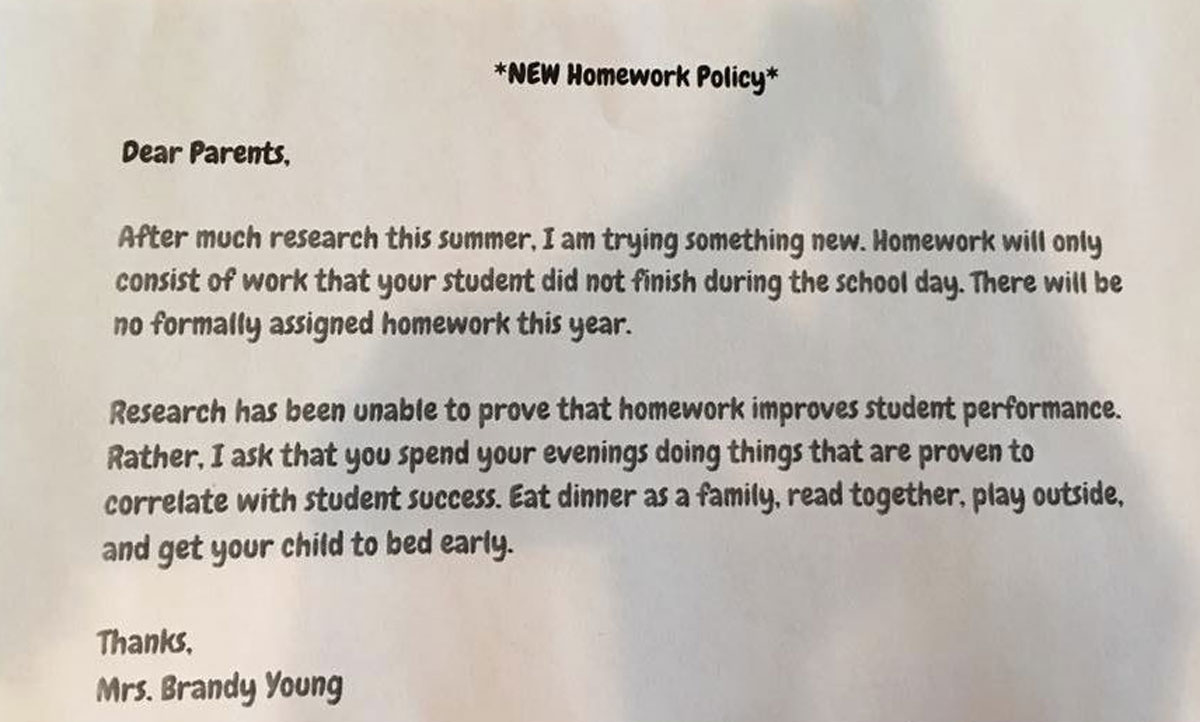A North Texas teacher's decision to skip homework for her second-grade class in favor of giving them more time to play and spend with family is sparking a debate about its value for young children.
Even as some parents praised the new policy and her announcement of it went viral on Facebook, a professor who has analyzed dozens of homework studies cautioned against the approach.
Brandy Young, a teacher at Godley Elementary School in Johnson County, told parents she would not send home assignments because research had been "unable to prove that homework improves student performance." Only work unfinished during the day would have to be completed at home, she wrote.
She instead asked parents to spend their evenings doing things that would help their child to succeed in school and offered these suggestions: Eat dinner as a family, read, play outside and go to bed early.
 NBC 5 News
NBC 5 News"Take what you've learned in the classroom and apply it outside of the classroom," Young said. "That's what I hope they're doing with the learning that they get in my room."
Local
The latest news from around North Texas.
Her letter to parents was posted on Facebook by a mother, Samantha Gallagher, who wrote that her daughter was loving her new teacher. The post has been shared more than 69,000 times.
Asked about the policy, the superintendent of the Godley Independent School District, Rich Dear, said that teachers in the district were encouraged to be innovative and to do what was best for their pupils.
"And Brandy and some of our second-grade teachers felt like that reducing assigned homework was good for our kids," he said. "And I support them for putting our learners first."
[[375690231,C]]
A half dozen second-grade teachers were dropping homework for the year and would evaluate the results in their classrooms, Dear said.
"We're not saying we won't ever assign homework," he said. "We're just saying we aren't assigning homework just for the sake of assigning it. Meaningful homework will always have its place."
One education professor, Harris M. Cooper of Duke University, the author of "The Battle Over Homework," disagreed with Young's assessment of homework. It can improve achievement for second-graders if it covers vocabulary, spelling, math and other subject matter that children learn through practice, he said.
Homework can be beneficial in other ways too, he said. It can show children that what they learn at school can apply to what they enjoy doing at home. It lets them know that they can learn anywhere. It can help them develop strong study and time management skills. And it allows parents to keep up with what their children are doing in school.
Assignments for children that age should take 20 minutes and should be short, simple and lead to success, he said. Children can be asked to read the back of a cereal box and discuss it in school or to apply math to sports that they like, whether goals scored in soccer or a batting average.
"Make it relevant, make it fun and make it part of what kids want to do," he said. "That's her challenge, not cut it off entirely."
A Met Life survey done in 2007 found that 60 percent of parents thought that schools were giving the right amount of homework, according to Tom Loveless, a senior fellow at the Brookings Institution and the author of The Brown Center Report on American Education, an annual report analyzing trends in education. Twenty-five percent said the amount was too little and only 15 percent said too much.
Another poll conducted by Public Agenda in 2006 reported similar numbers: 68 percent of parents finding the amount of homework about right, 20 percent saying too little and 11 percent saying too much. And a third poll, by AP-AOL in 2006, had the highest percentage of parents saying too much homework was assigned, 19 percent, to 23 percent too little and 57 percent about right, Loveless said.
Vicki Abeles, a producer and director whose documentary "Race to Nowhere" looked at what she calls the pressure-cooker culture dominating American schools, said she was in favor of Young's approach.
"Six hours in school is already a full work day for a 7-year-old, and adding more seat time to that day only squeezes out other activities that are just as critical to healthy growth," said Abeles, now the author of "Beyond Measure: Rescuing an Overscheduled, Overtested, Underestimated Generation." "The practice of assigning homework is a reflex -- something we do because it's been done that way before, not because we actually sat down and considered what was most beneficial to kids. And it's refreshing to see a teacher break the habit."



